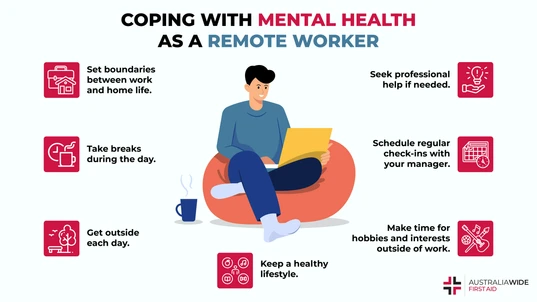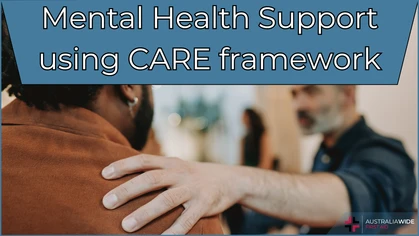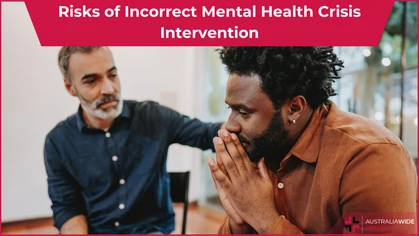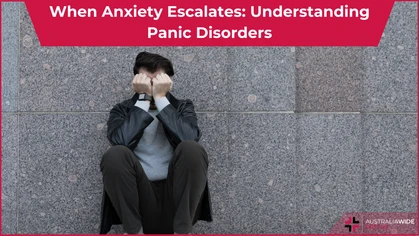The Effects of Remote Work on Mental Health

Mental Health

Remote working exploded in popularity during the COVID-19 pandemic, and it now allows people to work more flexibly. However, remote working can also lead to mental health issues like increased stressed. As such, it is important to know how to nurture your mental health in a remote work setting.
The world of work is changing. Technology has made it possible for more and more people to work remotely, either from home or from other locations outside of the traditional office setting. This can have a number of benefits, including increased flexibility and productivity. However, there are also some potential downsides to working remotely, one of which is the impact on mental health.Ways Remote Work Can Affect Mental Health
There are a number of ways in which working remotely can impact mental health.- Potential for isolation and loneliness. When you're not physically present in an office, it can be difficult to build and maintain social connections. This can lead to feelings of loneliness and isolation, which can in turn contribute to depression and anxiety.
- Increased stress and anxiety. The lack of structure and support that can come with working remotely can lead to increased stress levels. This can be compounded by worries about job security, as well as the feeling that you are always 'on call' and available to work.
- Difficulty disconnecting from work. When your office is in your home, it can be difficult to switch off from work at the end of the day. This can lead to burnout and further exacerbate stress levels.
- Poor sleep quality. Remote workers often report higher levels of fatigue and poorer sleep quality than those who work in a traditional office setting. This can be due to a number of factors, including working longer hours, staring at screens for prolonged periods of time, and having difficulty disconnecting from work at the end of the day.
Warning Signs of Mental Health with Remote Work
There are a number of warning signs that may indicate that someone is struggling with their mental health while working remotely. If you or someone you know is experiencing any of the following, it's important to seek help from a qualified mental health professional:- Feeling isolated and lonely.
- Increased stress and anxiety levels.
- Difficulty disconnecting from work.
- Poor sleep quality.
- Feeling overwhelmed by work.
- Procrastinating more than usual.
- Difficulty concentrating on work tasks
- Increased use of alcohol or drugs
- Withdrawing from social activities
- Changes in appetite or weight
What Can Be Done to Support Mental Health for Remote Workers?
As a manager, it's important to be aware of the potential mental health risks associated with remote work. If you notice that one of your employees is struggling, there are a number of things you can do to support them.- Check in regularly. Make sure to check in with your remote workers on a regular basis, and ask how they're doing both mentally and emotionally. This will help you to identify any early warning signs of trouble.
- Encourage social connection. One way to help reduce feelings of loneliness and isolation is to encourage your employees to connect with one another online or in person. You can also provide opportunities for them to get together in person if possible.
- Promote work-life balance. It's important for remote workers to have boundaries between their work lives and personal lives. Help them find ways to relax and de-stress outside of work, such as by taking breaks, going for walks, or reading before bedtime.
- Offer flexible working arrangements. Some people may find it harder to disconnect from work when they have more flexibility with their hours. If this is the case, consider offering alternative working arrangements until the employee feels more able to disconnect fully at the end of the day.
- Seek professional help. If you're concerned about an employee's mental health, encourage them to seek help from a qualified professional. This can be done through their Employee Assistance Program (EAP) if they have one, or by providing them with a list of recommended counsellors or therapists in their area.
Tips for Improving Mental Health
In addition to the measures that can be taken by employers, there are also a number of things that remote workers can do to improve their mental health.- Make time for social interaction. If you're working remotely, it's important to make time for social interaction. This could involve meeting up with friends or colleagues for coffee or lunch, going for a walk with a friend, or joining a club or hobby group.
- Set boundaries between work and home life. It's important to set boundaries between work and home life when you're working remotely. This might involve setting regular working hours and sticking to them, making sure you take breaks during the day, and not working evenings and weekends if possible.
- Take breaks during the day. It's important to take breaks during the day, even if you're working from home. Get up and move around regularly, take a few minutes to stretch or do some relaxation exercises, and make sure you take a lunch break.
- Get outside each day. Spending time outdoors has been shown to have a number of benefits for mental health, so it's important to get outside each day, even if it's just for a short walk around the block.
- Keep a healthy lifestyle. Eating a healthy diet, exercising regularly, and getting enough sleep are all important for maintaining good mental health. If you're working remotely, it's important to make sure you're taking care of yourself physically as well as mentally.
- Seek professional help if needed. If you're struggling to cope with the demands of working remotely, it's important to seek professional help. A qualified mental health professional can provide support and guidance on how to manage stress and anxiety, and can offer coping strategies for dealing with difficult situations.
- Schedule regular check-ins with your manager or supervisor to discuss workload, expectations, and any concerns you may have. This will help to keep stress levels in check and ensure that you're on track with your work.
- Make time for hobbies and interests outside of work. This will help you to disconnect from work at the end of the day and maintain a healthy balance between your professional and personal life.
Emotional First Aid for Remote Workers
Managers with first aid skills can respond to their clients' needs appropriately by being aware of the warning signs that someone is struggling with their mental health. Mental health issues can be difficult to deal with, both for the person experiencing them and for those around them. It's important for managers to be able to identify when an employee is struggling, and to know how to provide support. If you're a manager of remote workers, it's important to:- Have a good understanding of mental health and the different types of mental illness
- Be aware of the signs that someone is struggling with their mental health
- Know how to provide support to someone who is struggling
- Be aware of the resources and support services available
- Be aware of the signs that you may be struggling with your mental health
- Seek help from a qualified professional if you're struggling to cope
- Follow the tips for improving mental health
- Understand your first aid rights and responsibilities
Mental Health Support
Education is key to creating a society that embraces mental health with the same importance as physical health. Misconceptions and stigma, left unchecked, can discourage people from seeking life-changing support. Recognising the early indicators of mental ill-health is crucial for preventing potential crises and ensuring timely intervention. This knowledge can save lives and foster resilience in your community. A Mental Health Support Course equips you with the ability to identify when someone is struggling and offers the guidance needed to step in and help effectively.
Originally published at
https://www.australiawidefirstaid.com.au/resources/mental-health-remote-working-affect
as part of the Australia Wide First Aid Articles Library









